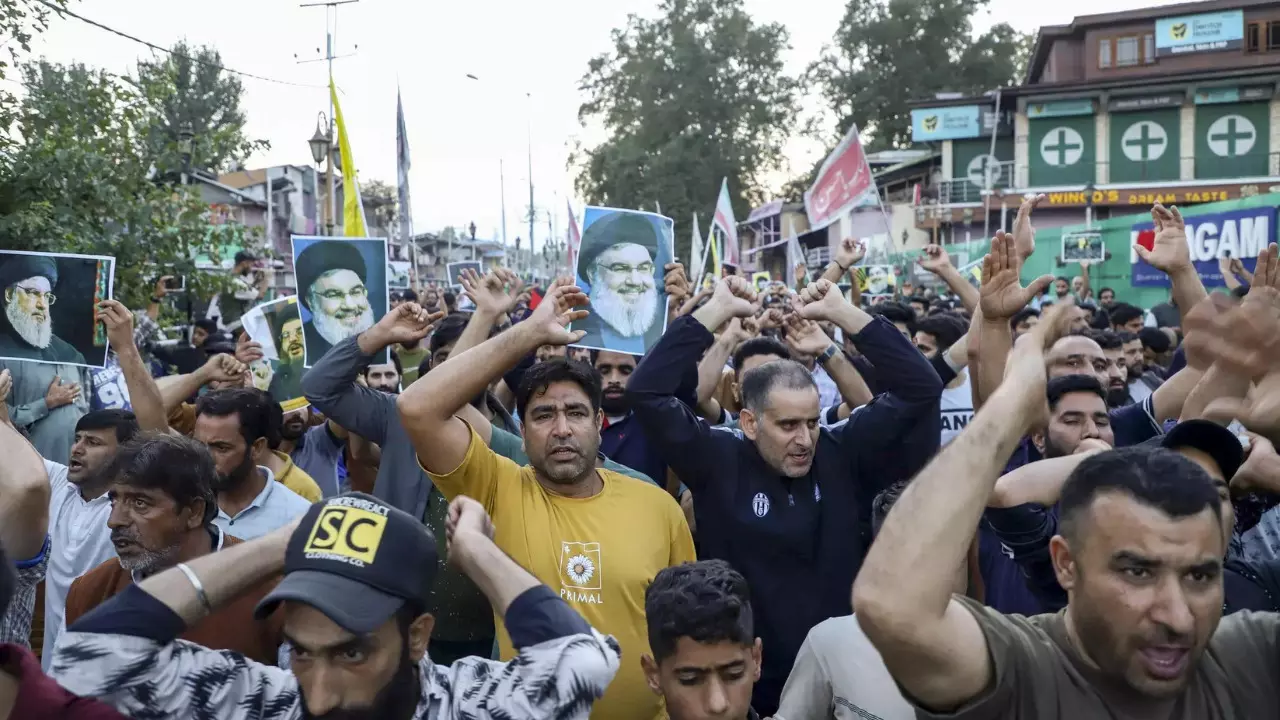How Will Hassan Nasrallah's Death Influence the Jammu & Kashmir Elections?
Protests and Political Campaign Halts Amid Rising Support for Hezbollah in Kashmir;

The third and final phase of elections in Kashmir is scheduled for October 1, but the atmosphere there has completely changed even before that. Thousands of people have come out on the streets, and mourning is being observed in support of Qasim Suleimani, Ismail Haniya, and Hassan Nasrallah.
Lebanon’s militant group Hezbollah Chief Hassan Nasrallah was killed in an attack by Israel on 27th September. People are expressing their anger against Israel and America by raising slogans like 'Jab Tak Suraj Chand Rahega, Hezbollah Ka Naam Rahega' and 'America Ka Jo Yaar Hai, Gaddar Hai Gaddar Hai'. Kashmiri leaders have stopped campaigning in protest against Israel's attack on Hezbollah. The question arises that if the leader of Hezbollah was killed, then why is there so much commotion in Kashmir?
Hassan Nasrallah’s death impact on Jammu & Kashmir Election
The atmosphere is heating up in the third phase of the elections, especially in the parties of Mehbooba Mufti and Omar Abdullah. They are maintaining their hold on the atmosphere even without campaigning. Hassan Nasrallah, Ismail Haniya, and Qasim Suleimani used to run terrorist organizations, which is why they were killed. But Nasralla's support is being seen because the Shia vote has become important in Kashmir's elections. Hezbollah leader Nasrallah has deep ties with the Shia community, and the areas where protests are taking place are Shia-dominated.
Shia Muslims are 14% in Kashmir, and Shia votes can play a decisive role in 15 of the 47 assembly seats. Areas like Budgam, which has the highest number of Shia voters (about 48%), have already become a part of the second phase of elections. Now the effect of Shia votes is being seen on the seats of the third phase.
Shia-dominated seats of the third phase
Uri assembly seat of Baramulla, where there is 21% Shia population. Sonawari of Bandipora, where there is 30% Shia population. Gulmarg of Baramulla, where there is 25% Shia population. Pattan of Baramulla, where there are 35% Shias.
Effect of Nasrallah factor
Earlier, votes were being cast on issues like electricity, water, unemployment and Article 370 in Kashmir, but now the issue of Hezbollah and Nasrallah is influencing the Shia voters. It may not have much effect on Sunni voters, but the atmosphere is changing rapidly in Shia-dominated areas. Mehbooba Mufti has decided not to campaign and has tried to show herself as the most saddened by Nasralla's death so that she can gain the sympathy of Shia voters. Earlier also Mehbooba had called terrorist Burhan Wani a martyr, and now she is doing the same for Nasralla.
National Conference is also leaning towards the Shia vote by supporting Hezbollah. Omar Abdullah's MP Agha Ruhullah Mehdi has also announced to end of the election campaign. BJP says that the talks of these parties are electoral and their real aim is to get 14% of Shia voters in their favor.
Shia voting pattern in Kashmir
The Shia community usually comes out in large numbers to vote, while the Sunni community votes relatively less. If the Shia votes in favour of a party in the name of Nasrallah, it will have a direct impact on the election results.
Kashmir parties trying to woo Shia votes
Kashmir parties are mourning the death of Nasrallah, but the real purpose is to woo Shia voters. They are trying to cash in on the sentiments of the Shia community by raising slogans against Israel. While organisations like Hezbollah and Hamas are terrorists, which work like organisations like India's Jaish and Lashkar, Israel wants to eliminate these organisations. Hezbollah has weakened after Nasrallah's death, but its retaliation against Israel continues.

